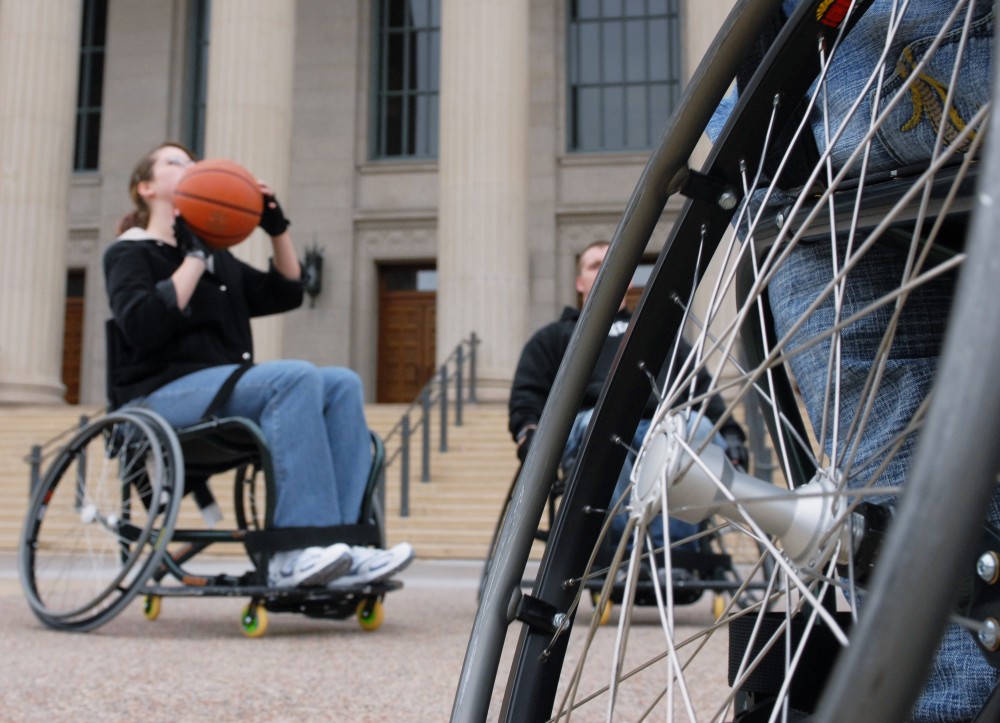When students with disabilities who play wheelchair sports are looking at colleges, the University isnâÄôt usually at the top of their list, but the Adapted Sports Club hopes to change that. Senior Rachel Garaghty, co-director of the Disabled Student Cultural Center and member of the ASC said the University is working to grow its wheelchair sports program. âÄúIt is absolutely critical that students with disabilities are able to participate in athletics at the University of Minnesota,âÄù she said. To bring awareness to disability issues, like the need for active wheelchair sports teams on campus, the DSCC and ASC offered students the opportunity to play wheelchair basketball Tuesday on the Northrop Auditorium Plaza as part of OctoberâÄôs National Disability Awareness month. Ten manual sport-style wheelchairs and gloves were available for students to try out wheelchair basketball. According to the Disability Student Services 2004-2005 annual report, the most recent data available, there are 1,086 University students with a registered disability. Of those, 70 reported a mobility disability, which includes being in a wheelchair. Garaghty said most students donâÄôt know about the ASC, which is something she hopes to change. âÄúI hope to grow it into more of a league in the future,âÄù she said. âÄúI would like to see the U of M get a wheelchair basketball team or power hockey team.âÄù The group will focus its efforts this year to get word out to students with disabilities, as well as trying to recruit student athletes with disabilities to come to the University. Schools with more prominent wheelchair sports programs like Southwest Minnesota State University , the University of Wisconsin-Whitewater and the University of Arizona , are more attractive to these types of students, Garaghty said. âÄúThe biggest challenge is getting students with disabilities who play sports to come to the U of M,âÄù she said. âÄúAdapted sports are pretty big at the high school level and students who participate in adapted sports pretty seriously donâÄôt even really consider the U of M.âÄù A year old this fall, the ASC has really only seen a response from students without disabilities, club treasurer Vang Moua said. The ASC has access to 10 sport-style wheelchairs, which run at a cost of $1,000 to $1,500 apiece, through the University Department of Recreational Sports, Moua said. Getting students to try playing at TuesdayâÄôs event was more difficult than expected, political science first-year and DSCC board member Laura Zimmermann said. She said by playing, students can gain a better understanding of the difficulties one can face being in a wheelchair. âÄúTrying to make a basket, itâÄôs so much harder,âÄù she said. âÄúWhen you play regular basketball you have your legs to help you.âÄù In between classes, accounting first-year August Spiegelberg said he decided to give wheelchair a try. After playing for awhile, Spiegelberg said he was amazed at how much physical work it took to maneuver the wheelchair. âÄúI wouldnâÄôt want to a take a right hand [punch] from somebody in a wheelchair,âÄù he said. âÄúYou get a lot of upper body strength from this.âÄù Whether a person is disabled, Garaghty said wheelchair basketball has benefits for everyone. âÄúImagine you love to play basketball,âÄù she said. âÄúNow imagine the challenge of having to play it in a wheelchair. ItâÄôs a whole new challenge.âÄù

Image by Tara Sloane
Wheelchair Basketball – Northrop Plaza
Club brings awareness to wheelchair sports
Published October 14, 2008
0

